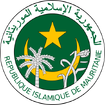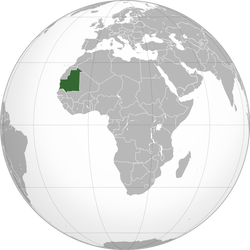|
الجمهورية الإسلامية الموريتانية | |

|

|
| Motto شرف إخاء عدل Honor, Fraternity, Justice | |
| Anthem National Anthem of Mauritania | |
| Capital | Nouakchott |
| Government | Islamic republic |
| President | |
| - From 2009 | Mohamed Ould Abdel Aziz |
| Prime Minister | |
| - From 2008 | Moulaye Ould Mohamed Laghdaf |
| Legislature | Parliament |
| - Upper house | Senate |
| - Lower house | National Assembly |
| History | |
| - November 28, 1958 | Autonomy |
| - November 28, 1960 | Independence |
| Area | 1,030,700 km² |
| Population | |
| - 2009 | 3,069,000 |
| Density | 2.9/km² |
| GDP | 2009 (PPP) |
| - Total | US$ 6.4 billion |
| - Per capita | US$ 2,093 |
| Currency | Ouguiya |
| v | |
The Islamic Republic of Mauritania is a republic in Western Africa.
Background
Independent from France in 1960, Mauritania annexed the southern third of the former Spanish Sahara (now Western Sahara) in 1976 but relinquished it after three years of raids by the Polisario guerrilla front seeking independence for the territory. Maaouya Ould Sid Ahmed TAYA seized power in a coup in 1984 and ruled Mauritania with a heavy hand for more than two decades. A series of presidential elections that he held were widely seen as flawed. A bloodless coup in August 2005 deposed President TAYA and ushered in a military council that oversaw a transition to democratic rule. Independent candidate Sidi Ould Cheikh ABDALLAHI was inaugurated in April 2007 as Mauritania's first freely and fairly elected president. His term ended prematurely in August 2008 when a military junta led by General Mohamed Ould Abdel AZIZ deposed him and ushered in a military council government. AZIZ was subsequently elected president in July 2009 and sworn in the following month. The country continues to experience ethnic tensions among its black population (Afro-Mauritanians) and white and black Moor (Arab-Berber) communities, and is having to confront a growing terrorism threat by al-Qa'ida in the Islamic Maghreb (AQIM).[1]
Economy
Half the population still depends on agriculture and livestock for a livelihood, even though many of the nomads and subsistence farmers were forced into the cities by recurrent droughts in the 1970s and 1980s. Mauritania has extensive deposits of iron ore, which account for nearly 40% of total exports. The nation's coastal waters are among the richest fishing areas in the world but overexploitation by foreigners threatens this key source of revenue. The country's first deepwater port opened near Nouakchott in 1986. Before 2000, drought and economic mismanagement resulted in a buildup of foreign debt. In February 2000, Mauritania qualified for debt relief under the Heavily Indebted Poor Countries (HIPC) initiative and nearly all of its foreign debt has since been forgiven. A new investment code approved in December 2001 improved the opportunities for direct foreign investment. Mauritania and the IMF agreed to a three-year Poverty Reduction and Growth Facility (PRGF) arrangement in 2006. Mauritania made satisfactory progress, but the IMF, World Bank, and other international actors suspended assistance and investment in Mauritania after the August 2008 coup. Since the presidential election in July 2009, donors have resumed assistance. Oil prospects, while initially promising, have largely failed to materialize, and the government has placed a priority on attracting private investment to spur economic growth. The Government also emphasizes reduction of poverty, improvement of health and education, and privatization of the economy.[2]
President
- Mohamed Ould Abdel Aziz (₩) (August 5, 2009 - )
Prime Minister
- Moulaye Ould Mohamed Laghdaf (₩) (August 14, 2008 - )
Nation
Mauritanian Polities
Colony of Mauritania
Overseas territory of Mauretania
Neighbouring Nations
References
- Country Studies: Mauritania (Library of Congress)
- Mauritania: Guide to Law Online (Library of Congress)
- The World Factbook (CIA)
- Chiefs of State and Cabinet Members of Foreign Governments (CIA)
- U.S. Department of State
- Australian Government
- Inter-Parliamentary Union - Senate
- Inter-Parliamentary Union - National Assembly
- BBC News Country Profile
- BBC News Time Line
- World Statesmen.org
- International Constitutional Law Project
- Psephos Election Archive
- Wikipedia
